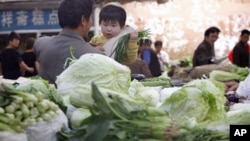A study by the Asian Development Bank finds that domestic food prices in many regional economies have risen on average 10 percent in early 2011.
Xianbin Yao, director general of the Regional and Sustainable Development Department at the Asian Development Bank, says these steep price increases could push an additional 64 million people into extreme poverty.
"Asia, despite its rapid growth, and it is still home to a majority of the worlds poor. We have about 900 million in this, absolute poverty. And, it is for this group of people, they are spending on about average two thirds, more than two thirds on foods. So, with a 10 percent increase on food prices their real income eroded," Yao said.
Some food inflation was expected, but the report says that fast and persistent increases in the cost of many Asian food staples, coupled with sharply rising oil prices, could weaken Asian economies.
If the global food and oil price hikes seen in early part of 2011 persist for the remainder of the year, the report says, economic growth in the region could be reduced by up to 1.5 percent.
The report says many of the conditions that drove up food prices in 2008 are at work again. These include rising demand from wealthier developing countries; competing uses for food grains; shrinking available agricultural land; and, stagnant or declining crop yields. Also this year, a weakened dollar and production shortfalls caused by bad weather could push prices higher.
To avert a looming crisis, Yao says Asia countries with surplus supplies of grain or rice should refrain from imposing export bans on food.
"ADB, the Asian Development Bank, has been working with this group of countries to establish such a system to help deal with the future emergencies -- when one country requires importing food and other countries can provide, so more of a cooperative approach rather than a competitive approach," Yao stated.
He says, in the long term, Asian economies must invest more in agriculture to increase crop production and expand storage facilities.
ADB: Rising Food Prices Could Increase Poverty in Asia












